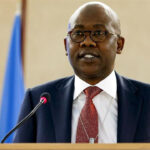
The Nigeria Police Force (NPF) has 370,000 men and women. This roughly means that one police officer is available to safeguard the lives and property of 500 Nigerians. This compares favourably to a police officer per population ratio of 352 citizens in USA, 358 in South Africa, 513 in South Korea and 294 in France.
But since the Assistant Inspector General of Police, Zone 5, Mr. Rasheed Akintunde, recently revealed that 80% of officers of the NPF are assigned to secure VIPs rather than the general public, Nigeria’s effective police officer to population ratio is 1 to 2,514. This ranks among the lowest police-population ratios in the world, comparable to Niger, the world’s second poorest country (1-2,439), and Mali, one of the most insecure countries in the world (1-2,632).
Nigerians tend to disdainfully condemn this monopolization of scarce policing resources as “privatization”. Perhaps, privatization of policing is one of the key answers to the problems of limited policing resources and rising insecurity in Nigeria. It is possible and desirable to make better-off Nigerians pay directly for state-provided services like policing and roads. Unfortunately, the Government organizes state-provided services on the basis of “blind pricing” i.e. taxes and/or uniform provision i.e. supply at same quality and quantity regardless of the capability or willingness of different classes of consumers to pay. Thus, roads in the most expensive neighborhoods are often no better than those where the poorest Nigerians live. Petroleum, a product better supplied at competitive market prices by the private sector, is supplied below the cost of supply to rich and poor Nigerians. Government charges every Nigerian same low price for services like higher education and complex healthcare services which are best provided by or at least require strong government investment as pressures for short-term profits make it very unlikely for the private sector to meet the level of investments in high-level research and training required to guarantee excellence. The result is pervasive underinvestment in and poor rate of renewal of critical public goods essential for human welfare and economic productivity, or simply modern life.
Nigeria has to find original solutions to the imperative of adequate funding of public goods and achieving high-quality provision of public services to the poor as well as the rich. These solutions do not have to have been previously tried in Cuba or China or recommended by the World Bank or the International Monetary Fund. They do not have to be socialist or capitalist. They have to be Nigerian solutions rooted in an understanding of our own peculiar problems and circumstances and intelligent, open-minded search for innovative solutions. As regards security and our abysmally low police officer-population ratio, the Nigeria Police Force should recruit, train and equip excess personnel for hire to Nigerians who desire additional security to what the government can provide every taxpayer. The additional police officers, constituting a “VIP” pool in the NPF, should be hired out at a profit; they should have a different colour uniform, enabling easy detection of any VIP freeloading on regular tax-funded police. This profit would be invested in better salaries and equipment for all policemen and women. This “privatization” of the Nigerian Police would improve security by putting more and better-motivated police officers on our streets. It would also go some way in providing a significant level of direct employment and boost economic growth by making the production and exchange of goods and services safer in Nigeria. The only thing we have to lose are the dogmas regarding how the provision of public services is organized and funded. The Government should always aim to make richer Nigerians pay directly for state-provided services, thus allowing it to recoup its investment and reinvest in strengthening services.
Temitayo Lawal is a public affairs consultancy and a member of The Peter Bauer Foundation (aka The Liberal Forum)


